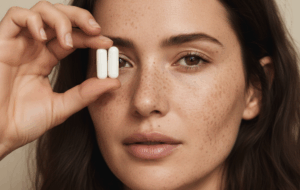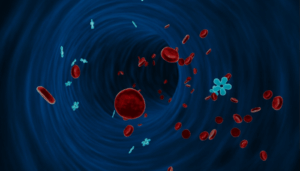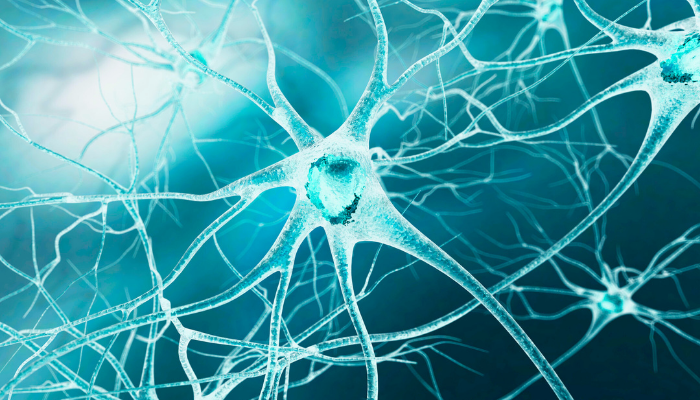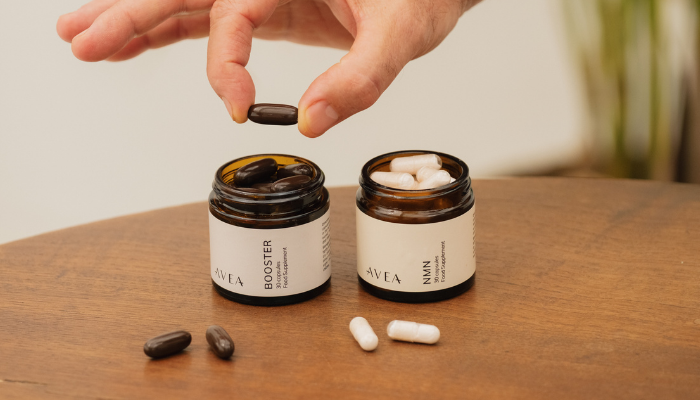In this article
Why Senescent Cells Accelerate Ageing
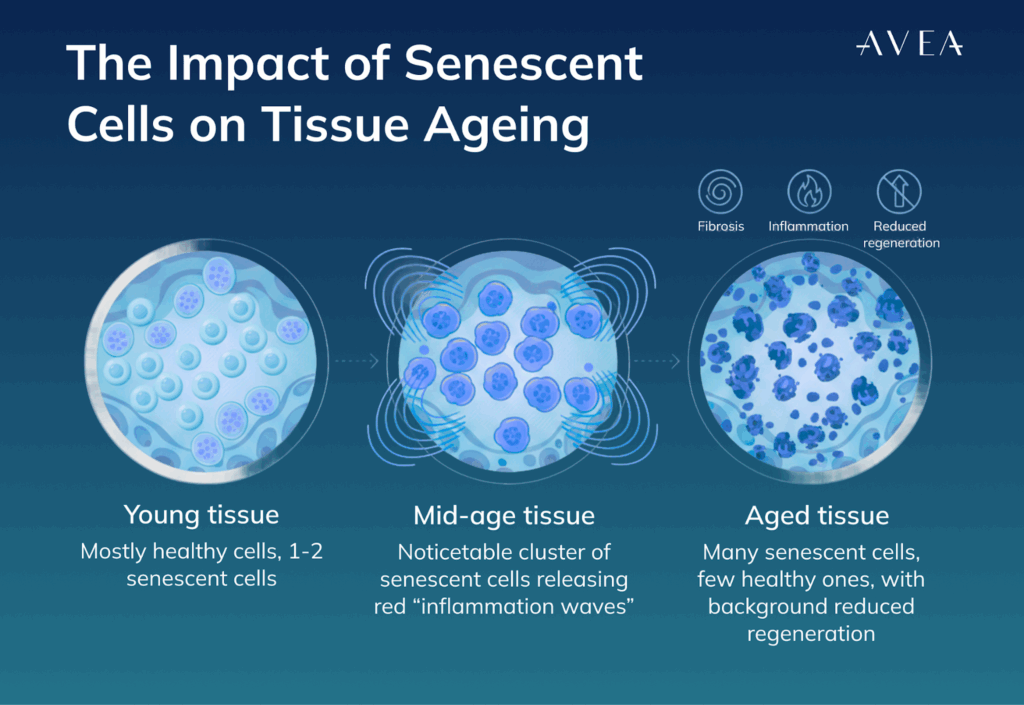
Senescent cells — often called “zombie cells” — are cells that have stopped dividing but don’t die. Instead, they linger in tissues, releasing inflammatory molecules (the senescence-associated secretory phenotype, SASP) that harm neighbouring cells, degrade tissue function, and contribute to age-related decline.
Over time, senescent cells accumulate in organs and tissues, fueling chronic inflammation, fibrosis, and loss of regenerative capacity. Scientists now see them as one of the hallmarks of ageing.
Targeting senescence can be done in two ways:
- Senolysis – selectively removing senescent cells.
- Cellular support – improving repair, autophagy, and antioxidant defences so healthy cells stay resilient.
Six natural compounds stand out as very promising in this space.
Fisetin – A Senolytic Flavonoid

Food sources: strawberries, apples, persimmons, onions.
Fisetin is a plant flavonoid with direct senolytic properties. Unlike most antioxidants, Fisetin can selectively trigger apoptosis (programmed cell death) in senescent cells, reducing their toxic influence.
Mechanisms of action:
- Induces apoptosis in senescent cells via the PI3K/AKT and mTOR pathways.
- Reduces pro-inflammatory cytokine production from SASP.
- Enhances neuronal survival by activating protective proteins.
- In preclinical studies, supplementation extended lifespan in mice and improved tissue function.
Key benefits: Lower senescent cell burden, reduced inflammation, brain protection.
Quercetin – Antioxidant and Senolytic Support

Food sources: onions, apples, citrus fruits, broccoli, olive oil.
Quercetin is one of the most common dietary flavonoids. It is primarily known for its antioxidant and anti-inflammatory properties, but also shows senolytic effects, especially in synergy with other compounds.
Mechanisms of action:
- Scavenges free radicals and reduces oxidative stress.
- Enhances endothelial function by increasing nitric oxide bioavailability, improving blood vessel health.
- Modulates NF-κB and NLRP3 inflammasome pathways, lowering inflammation.
- Acts as a mild senolytic in preclinical models, though often more effective when paired with agents like Fisetin or Dasatinib.
Key benefits: Protects cardiovascular and cognitive health, reduces oxidative stress, may support clearance of senescent cells.
Spermidine – Activator of Autophagy

Food sources: wheat germ, soybeans, mushrooms, aged cheese, legumes.
Spermidine is a naturally occurring polyamine that activates autophagy, the process by which cells recycle damaged proteins and organelles.
Autophagy works like an internal clean-up system: it clears out dysfunctional material that would otherwise accumulate and push cells into senescence. By stimulating autophagy, Spermidine helps cells stay efficient, youthful, and resilient.
Mechanisms of action:
- Stimulates autophagy via inhibition of acetyltransferases and activation of autophagy-related genes (ATGs).
- Promotes cardiovascular health by improving endothelial function.
- Supports mitochondrial quality by helping to clear damaged organelles.
- In human observational studies, higher dietary Spermidine intake is associated with reduced overall mortality.
Key benefits: Cellular renewal, cardiovascular support, reduced risk of age-related decline.
PQQ – Mitochondrial Biogenesis Factor

Food sources: natto, parsley, green peppers, kiwi.
Pyrroloquinoline Quinone (PQQ) is a redox cofactor that plays a unique role in mitochondrial health. It not only acts as an antioxidant but also supports mitophagy — the selective removal of damaged mitochondria.
Damaged mitochondria produce excess free radicals, which accelerate ageing and push cells toward senescence. By promoting mitophagy, PQQ ensures these defective power plants are removed and replaced with new, healthy ones.
Mechanisms of action:
- Activates PGC-1α and CREB signalling pathways, stimulating mitochondrial biogenesis.
- Enhances cellular energy metabolism and ATP production.
- Stabilises redox balance and reduces ROS.
- Provides neuroprotection by supporting nerve growth factor (NGF) activity.
Key benefits: Increased energy production, healthier mitochondria, lower oxidative stress, reduced risk of senescence.
Ergothioneine – The Rare Antioxidant with a Dedicated Transporter

Food sources: mushrooms, black beans, oats, organ meats.
Ergothioneine is an amino acid derivative with antioxidant properties so unique that humans have evolved a dedicated transporter (OCTN1) to absorb and distribute it. It preferentially accumulates in mitochondria and stem cells, where protection is most needed.
Mechanisms of action:
- Scavenges reactive oxygen and nitrogen species.
- Protects mitochondrial membranes and DNA from oxidative damage.
- Concentrates in stem cells, suggesting a role in preserving regenerative capacity.
- Proposed by scientists as a candidate “longevity vitamin” due to its unique biology.
Key benefits: Protection of DNA and mitochondria, stem cell preservation, resilience under oxidative stress.
Selenium – Trace Mineral for Antioxidant Defence and Anti-Senescence Support

Food sources: Brazil nuts, seafood, eggs, whole grains.
Selenium is an essential micronutrient, required in small amounts but crucial for antioxidant defences and metabolic regulation.
Mechanisms of action:
- Serves as a cofactor for glutathione peroxidases and thioredoxin reductases, enzymes that neutralise reactive oxygen species (ROS).
- Regulates thyroid hormone metabolism.
- Supports immune function and antiviral defence.
- Protects against oxidative stress–induced DNA and protein damage.
Indirect anti-senescence effect:
Oxidative stress is one of the strongest triggers of cellular senescence. By reducing ROS and maintaining redox balance, Selenium helps protect healthy cells from entering the senescent state. In other words, while it does not clear zombie cells, it reduces the chance of new ones forming.
Key benefits: Antioxidant protection, immune support, thyroid regulation, reduced oxidative burden, anti-senescence support.
Why Supplementation Is Often Necessary
Although these compounds occur in foods, their natural levels are often too low to provide measurable anti-ageing effects:
- Fisetin from fruit is present in only trace amounts compared to doses used in research.
- Quercetin suffers from poor absorption, limiting its impact when consumed in diet alone.
- Spermidine-rich foods like wheat germ and aged cheese vary widely in content, and typical intake is modest.
- PQQ and Ergothioneine are rare in modern diets, making deficiency common.
- Selenium intake depends heavily on soil quality, which is depleted in many regions.
Supplementation offers a way to achieve consistent, effective levels. It also allows for synergistic combinations, where compounds enhance each other’s effects — for example, combining senolytics with autophagy activators and mitochondrial protectors.
A Synergistic Approach
Each of these six compounds targets a different hallmark of ageing — from senolysis (Fisetin, Quercetin) to autophagy (Spermidine), mitochondrial renewal and mitophagy (PQQ), stem cell protection (Ergothioneine), and oxidative stress defence (Selenium).
Together, they provide a multi-angle strategy against senescence and cellular decline.
This is why they are combined in AVEA’s Cell Primer: a formulation designed to bring these natural compounds together into one evidence-based supplement. By uniting senolytics, autophagy activators, and mitochondrial protectors, Cell Primer offers comprehensive support for healthy ageing.



